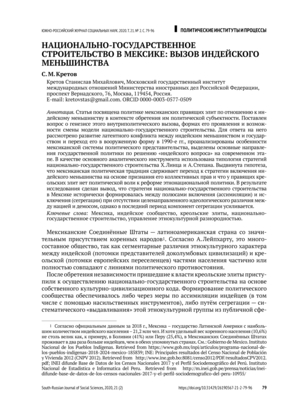Abstract
The article deals with the policy of the Mexican ruling elites towards the Indian minority in the context of their acquisition of political subjectivity. The question has been asked about the genesis of this internal political challenge, its manifestations and the possibility of changing the model of national-state building. In order to answer this question, the development of a latent conflict between the Indian minority and the State and its transition to armed form in the 1990s were considered, the peculiarities of the Mexican system of political representation have been analyzed, and the main directions of state policy on the «Indian question» at the present stage have been highlighted. The main analytical tool used is the typology of nation-state construction strategies of H.Linz and A.Stepan. It has been hypothesized that the Mexican political tradition is holding back the transition to a strategy of inclusion of the Indian minority based on the recognition of their collective rights, and that the ruling Creole elites lack the political will to reform ethnic and national policies. The study concluded that the strategy of nation-state building in Mexico has historically been shaped between the poles of inclusion (assimilation) and exclusion (segregation) in the absence of a purposeful ideological distinction between the nation and the demos; however, in the recent period, the segregation component has increased.
Keywords
References
- Cabrero, F. (2013). Cómo los indígenas amplían la ciudadanía. Ciudadanía intercultural. Aportes desde la participación política de los pueblos indígenas en Latinoamérica. Quito: PNUD. Retrieved from http://www.onu.cl/es/wp-content/uploads/2016/06/LIBRO-CIUDADANIA-INTERCULTURAL-PNUD-democracia.pdf
- Chernyshev, A. L. (2011). Bor'ba indeytsev Meksiki za zemlyu i avtonomiyu [The Mexican Indians’ Struggle for Land and Autonomy]. In Chumakova M. L., Martynov B. F. (Eds.) Indeyskiy mir pered vyzovami XX veka [The Indian World Faces the Challenges of the Еwentieth Century] (pp. 38–57). M.: ILA RAN.
- Davydov, V. M. (Ed.) (2013). Meksika: paradoksy modernizatsii [Mexico: The Paradoxes of Modernization]. M.: ILA RAN.
- Granada-Cardona, J. S. (2018). Alternatives for Latin American Integration. Beyond Racial Fusion and Multiculturalism. Latin America Perspectives, 45(2), 107–118. DOI: 10.1177/0094582X17741280
- Green, W. J. (2016). A History of Political Murder in Latin America: Killing the Messengers of Change. Albany: State University of New York Press.
- Gribanov, P. V. (1996). Etnicheskiye protsessy v Meksike [Ethnic Processes in Mexico]. Etnograficheskoye obozreniye [Ethnographic Review], 5, 57–70. Retrieved from http://journal.iea.ras.ru/archive/1990s/1996/no5/1996_5_57_Gribanov.pdf
- Harvey, N. (2016). Practicing Autonomy: Zapatismo and Decolonial Liberation. Latin American and Caribbean Ethnic Studies, 11:1, 1–24. DOI: 10.1080/17442222.2015.1094872
- Kudryashova, I. V., Kharitonova, O. G. (Eds.) (2020). Metamorfozy razdelennykh obshchestv [Metamorphoses of Divided Societies]. M.: MGIMO-Universitet.
- Ley, S., Mattiace, S., Trejo G. (2019). Indigenous Resistance to Criminal Governance: Why Regional Ethnic Autonomy Institutions Protect Communities from Narco Rule in Mexico. Latin American Research Review, 54(1), 181–200. DOI: 10.25222/larr.377
- Lijphart, A. (1997). Demokratiya v mnogosostavnykh obshchestvakh: sravnitel'noye issledovaniye [Democracy in Plural Societies: A Comparative Exploration]. M.: Aspekt Press.
- Linz, J. (1993). State Building and Nation Building. European Review, 1(4), 355–369. DOI: 10.1017/S1062798700000776
- Linz, J., Stepan, A. (1996). Problems of Democratic Transition and Consolidation. Southern Europe, South America, and Post-Communist Europe. Baltimore: The Johns Hopkins University Press.
- Linz, J., Stepan, A., Yadav, Y. (2004). “Nation State” or “State Nation”? Conceptual Reflections and Some Spanish, Belgian and Indian Data. Human Development Occasional Papers (1992–2007) HDOCPA-2004-15, Human Development Report Office (HDRO), N.Y.: United Nations Development Programme (UNDP). Retrieved from https://ideas.repec.org/p/hdr/hdocpa/hdocpa-2004–15.html
- Meentzen, A. (2007). Políticas públicas para los pueblos indígenas en América Latina. Los casos de México, Guatemala, Ecuador, Perú y Bolivia. Lima: Fundación Konrad Adenauer, Programa Regional Participación Política Indígena.
- Morales Silva, G. (2018). Comparing Ideologies of Racial Mixing in Latin America: Brazil and Mexico. Social Anthropology, 8(2), 427–456. DOI: 10.1590/2238–38752017v824
- Norrs, P. (2008). Driving Democracy: Do Power-Sharing Institutions Work? N.Y.: Cambridge University Press.
- Platoshkin, N. N. (2011). Istoriya Meksikanskoy revolyutsii. Istoki i pobeda 1810–1917 gg [History of the Mexican Revolution. Origins and Victory of 1810–1917]. M.: Universitet Dmitriya Pozharskogo: Russkiy Fond sodeystviya obrazovaniyu i nauke.
- Sokolova, I. V. (1992). Politika ofitsial'nogo indeanizma v Meksike (ideologiya i praktika) [Official Indianism in Mexico (Ideology and Practice)]. M.: IEA RAN.
- Sonnleitner, W. (2013). La representación legislativa de los indígenas en México: De la representatividad descriptiva, a una representación de mejor calidad. México Tribunal electoral del Poder Judicial de la Federación. Retrieved from https://www.te.gob.mx/publicaciones/sites/default/files//archivos_libros/Temas%20Selectos%20No.%2032.pdf
- Wolff, S. (2010). Consociationalism, Power Sharing, and Politics at the Center. Retrieved from http://www.stefanwolff.com/files/Consociationalism,%20Power%20Sharing,%20and%20Politics%20at%20the%20Center.pdf
 Русский
Русский


